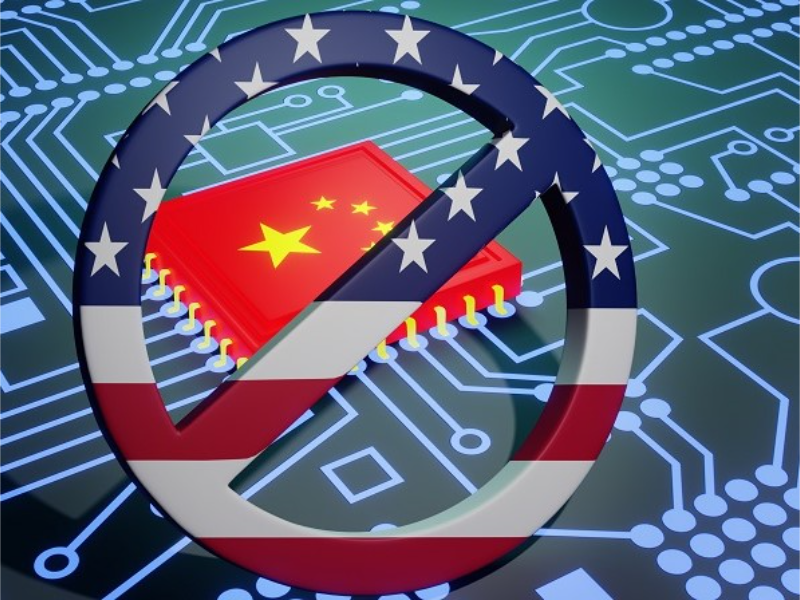- Wall Street’s semiconductor index lost over $500 billion on Wednesday due to reports of potential U.S. export restrictions on China.
- Intel, a major beneficiary of the U.S. Chips Act with $52.7 billion in subsidies, may gain from geopolitical tensions but faces concerns over revitalizing its manufacturing business.
OUR TAKE
The news that the US is considering stricter export restrictions on China has sparked market concerns about the stability of the chip supply chain, causing the Wall Street Semiconductor Index to evaporate more than $500 billion in a single day, a figure that is at a record high since 2020. This policy move has not only had an impact on local U.S. chipmakers, but also had a profound effect on the global chip supply chain. In particular, Taiwan’s position in the global supply chain as a key region for global chip production makes it possible for any related policy changes to trigger a chain reaction in the market. The stability of the global supply chain depends not only on technological advances, but is also significantly affected by geopolitical factors. Therefore, maintaining sensitivity to global economic and political dynamics is crucial to grasping industry trends.
–Elodie Qian, BTW reporter
What happened
Wall Street’s semiconductor index experienced its worst day since 2020, shedding more than $500 billion in market value on Wednesday. This significant drop was triggered by a report that the United States is considering stricter export controls on advanced semiconductor technology to China.
Donald Trump, the Republican presidential nominee, said Taiwan, a key production hub, should compensate the United States for its defense intensifying the sell-off in chip stocks. This stance has raised more concerns among investors about potential disruptions in the semiconductor supply chain.
In recent years, Washington has adopted a more protective approach towards the U.S. semiconductor manufacturing industry, recognizing its strategic importance in the global competition with China. The United States has warned its allies that it might impose the most severe trade restrictions if companies continue to provide China with access to cutting-edge semiconductor technology, according to Bloomberg News.
Despite beating second-quarter profit estimates, shares of Dutch chipmaking equipment provider ASML Holding plummeted by 13%.
Nvidia, a major player in AI technology, saw its stock price drop nearly 7%, resulting in a loss of over $200 billion in market capitalization.
Smaller competitors AMD and Arm also faced a decline, dropping about 10%, while Micron fell 6% and Broadcom lost 8%. In contrast, companies with U.S. chip manufacturing operations, such as GlobalFoundries, saw gains, with its shares jumping almost 7%. Intel, which is also building several plants in the U.S., edged up by 0.35%.
Also read: US mulls tougher trade curbs in chip crackdown on China
Also read: Nvidia navigates the great wall: Obstacles in the Chinese market
Why it’s important
Bob O’Donnell, chief analyst at TECHnalysis Research, commented, “Market reactions are likely short-lived because the fundamental factors driving these markets haven’t changed. Yes, U.S. restrictions on shipments to China will likely increase somewhat, regardless of the U.S. election outcome-but they’ve already been in place for a while.”
The Biden administration has been aggressive in curbing China’s access to state-of-the-art chip technology, issuing sweeping restrictions in October to limit exports of AI processors designed by firms like Nvidia. These measures have impacted U.S. chipmakers’ sales to China, with Nvidia’s revenue from China dropping to about 18% of its total revenue in the quarter ended April 28, down from 66% in the previous year.
Trump’s comments about Taiwan’s defense payments have also impacted the stock prices of Taiwan’s TSMC, the world’s largest contract chip maker, causing its U.S.-listed shares to fall by 8%. Taiwan plays a crucial role in the global chip supply chain, and any conflict could have severe economic repercussions.
The Philadelphia Semiconductor index saw a 6.8% collapse, marking its biggest one-day decline since the COVID pandemic. Despite this, the index remains up 30% for 2024, outperforming the S&P 500 index’s 17% gain, thanks to the AI boom.
Intel, which has been investing heavily to regain its manufacturing edge, could benefit from the current geopolitical tensions. The company is also one of the major beneficiaries of the U.S. Chips Act, signed by Biden in August 2022, which provided $52.7 billion in subsidies.
Policy experts predict that the U.S. focus on semiconductors will likely continue, potentially leading to more export restrictions on China and support for domestic chipmakers like Intel. However, there are concerns about Intel’s ability to revitalize its manufacturing business, given the company’s foundry segment reported an operating loss of $2.47 billion for the quarter ended March 30.
Michael Sobolik, a senior fellow at the American Foreign Policy Council, stated, “It’s likely President Trump would not only continue export restrictions but strengthen them. He initiated many semiconductor export controls during his first administration, including the powerful ‘foreign direct product rule’ that limited foreign parties from enabling Huawei’s access to semiconductors.”

